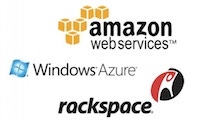June 27, 2012

By samdizzy

rackspace vs amazon
Rackspace and Red Hat, respectively, have been warning customers not to get locked into proprietary clouds such as Amazon Web Services and Microsoft Windows Azure. I’m all for open systems. But I’m more about quality solutions and services. So I believe the current Rackspace vs. Amazon and Red Hat vs. Microsoft cloud debates often miss the mark.To see the future of cloud computing let’s look back at the mobile, desktop and server platform wars. The Apple vs. Microsoft vs. Linux battle taught us a simple lesson: Customers don’t really care about open or closed systems. What they really care about is quality, reliable solutions in competitive marketplaces that deliver fair prices. I suspect that same history lesson will repeat itself in the cloud.
Some history worth exploring…
1. PCs and notebooks: When Microsoft stumbled badly with Windows Vista, Apple stepped in with Mac OS X and the Linux crowd enjoyed some temporary success with Netbooks.
But guess what?
Netbooks running Linux failed because they were lousy hardware systems. Open wasn’t better.
Gradually, Microsoft regained credibility with Windows 7 on mobile devices and desktops.
2. Smartphones and tablets:
Closed Wins: Apple has a closed system with iTunes and iOS running on iPhones and iPads. But guess what: Customers are willing to pay a premium for the closed system because, generally speaking, it delivers a great user experience.
Open Wins: Assuming you believe Android is an open system, it’s hard to debate the operating system’s momentum.
Closed Loses: It’s nearly time to say goodbye BlackBerry. And we see Microsoft’s struggle in the smartphone market — though Microsoft is hoping for a better showing with Windows 8 Phones.
Open and Closed Loses: HP WebOS bombed as closed source and I don’t see much momentum as open source.
Bottom line: Quality systems win. It’s not an open or closed debate here.
3. Servers:
Closed Wins: Windows Server has been humming along since around 1993 and sales continue to grow.
Open Wins: Linux servers, particularly those from Red Hat, have strong corporate market share.
Closed Loses: Unix remains a popular niche but the overall market shrank as Windows and Linux on x86 toppled most RISC hardware platforms. Plus, NetWare imploded because it failed to anticipate the application server revolution.
Open Loses: A lengthy list of Linux server distributions never gained mainstream success.
Cloud Conversation
Now apply those examples to the cloud but consider the ongoing chatter from the “open” camp:
Rackspace President Lew Moorman recently warned that some platforms as a service (PaaS) solutions are all about vendor lock-in. The target of his words: Amazon.
Rackspace declared war against proprietary clouds back in April 2012.
Red Hat in mid-2011 warned the government about potential cloud lock-in.
Red Hat in 2009 warned customers not to get locked into Windows Azure and VMware.
But can open source companies point to a single customer that got “locked” into the Windows Azure or Amazon Web Services clouds? Isn’t it relatively easy to turn off your Oracle database on Amazon, then fire it up again over on Rackspace? Wouldn’t the same be true for turning off SQL Azure then firing it up on Rackspace?
Bigger Conversation Points
Sure, CIOs and cloud integrators have to be extremely careful about where they build and host their cloud applications. Some customers run the risk of using single-vendor stacks that could be best of breed but don’t really offer a simple exit strategy.
But cloud computing is more than an open vs. closed conversation. The best channel partners are closely examining:
cloud service level agreements (SLAs, including all the fine print)
developer commitments to specific software and hardware platforms — which ones are gaining developers, and which ones are struggling to find developers?
business contracts — rather than software code — that attempt to lock customers onto specific platforms for a year or more, rather than offering current month opt outs.
Rackspace is shouting from the rooftops about the cloud lock-in risk. But within the halls of Rackspace a much more important story has emerged: The success of fanatical support as a true differentiator in the cloud market. Now that’s worth talking about.
You May Also Like
